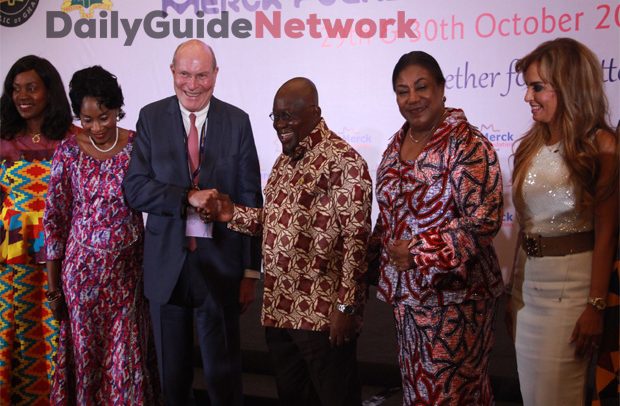President Akufo-Addo (3rd right) in a handshake with Prof. Dr. Stangenberg-Haverkamp (3rd left), Board Chair of MERCK Foundation, Rebecca Akufo-Addo (2nd right) and Dr. Rasha Kelej (right). Picture by Gifty Ama Lawson.
President Nana Addo Dankwa Akufo-Addo has made a passionate appeal for an end to the scourge of stigmatisation against persons with fertility problems, especially women in Africa.
He said couples, especially women who cannot give birth, should not be discriminated against in any form as it usually pertains largely in Africa.
Addressing the 6th Annual Conference of the Merck Foundation Africa Asia Luminary in Accra yesterday under the theme: ‘Together for a Better Future’, the President said, “The onus is on each and every one of us to work towards finding solutions to addressing infertility and ending stigmatisation.”

He said, “We must as a matter of necessity take urgent steps to incorporate issues regarding infertility prevention and treatment and the development of maternal and reproductive health care policies in our respective countries.”
“We are told by the World Health Organization (WHO) that 186 million people around the world experience either primary or secondary infertility. We in Africa are tagged as the continent with the highest birth rate and some countries in Central and Eastern Africa are also described as ‘the infertility belt’ of the world,” the President noted.
“WHO tells us again that even though infertility in men is the course of 50 per cent of cases of a couple’s inability to conceive, the economic, psychological and socio-cultural burden falls disproportionately on women,” he added.
Statistics have it that in Côte d’Ivoire, 26 per cent of infertile women compared with three per cent of fertile women have never been married, while in Ethiopia, 85 per cent of childless marriages end in divorce within five years.
“In Tanzania, a childless widow may not inherit her husband’s wealth. In South Africa, a survey conducted revealed higher levels of anxiety, depression and anger amongst infertile women. In Ghana, a woman who is infertile risks being treated as an outcast and having her marriage ended.
“These cases, I believe, are not peculiar to these countries only but are also representative of the unfortunate situation prevailing on the continent. It must end,” President Akufo-Addo stressed.
The Chief Executive Officer (CEO) of the Merck Foundation and Co-chairperson of the 6th edition of the Merck Africa Asia Luminary, Dr. Rashad Kelej, pledged the foundation’s continuous commitment to train more fertility specialists in order to assist the African continent to deal with the infertility phenomenon among women.

The Merck Foundation is the philanthropic arm of Merck KGaA Germany that aims to improve the health and well-being of people and advance their lives through science and technology.
First Lady Rebecca Akufo-Addo during a brainstorming session added her voice to the President’s call, expressing delight that African First Ladies are part of the great movement to address infertility in Africa.

“This is a movement of empathy, respect, empowerment and recognition of which your collective involvement is imperative to its success,” she said, adding “together we can make a difference, by building healthcare capacity, improving access to equitable health solutions and breaking the stigma of infertility in Africa and Asia.”

By Charles Takyi-Boadu & Jamila Akweley Okertchiri


